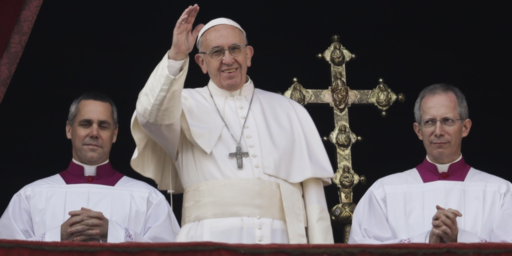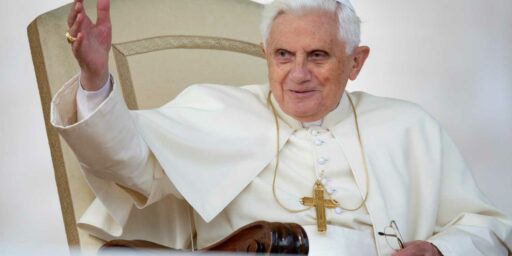Will Pope Benedict XVI Be Bad for Catholic-Jewish Relations?
Rabbi Michael Lerner thinks so, arguing that the new pontiff’s “raging reactionary” theology conflicts with the Jewish commitment to social justice. That’s a debatable point in itself, but this part of his argument is extremely weak:
Ratzinger also publicly critiques all those inside the church who are tolerant enough to think that other religions may have equal validity as a path to God. This is a slippery slope toward anti-Semitism and a return to the chauvinistic and triumphalist views that led the church, when it had the power to do so, to develop its infamous crusades and inquisitions.
While Pope Benedict XVI is doctrinally conservative, he’s also been active in Catholic-Jewish relations. Rabbi David Rosen provides the evidence:
As Cardinal Ratzinger, Pope Benedict XVI confirmed this view in an important article titled “Abraham Our Father” that appeared in the Vatican publication Osservatore Romano. He wrote it in the wake of widespread Jewish discomfort over his declaration “Dominus Iesus” affirming the theological supremacy of the Catholic Church. In the article, Cardinal Ratzinger sought to emphasize the unique relationship that the Church has with Judaism, and in a private conversation with me in Jerusalem some 15 years ago he told me, “Everything that has religious significance for you must have religious significance for me because you are our roots.”
But he has a further commitment to this relationship, which is influenced by his own personal background. In 1994, Ratzinger was the keynote speaker at an impressive international Jewish-Christian conference in Jerusalem (of some 300 Christian and Jewish leaders from around the world) that I was privileged to chair.
He commenced his address with the words, “The history of relations between Israel and Christianity is filled with blood and tears. After Auschwitz, the mission of reconciliation and acceptance cannot be delayed.”
[…]
Moreover, in addition to affirming the Jewish people’s special status as “elder brother” (using Pope John Paul II ‘s phrase), giving them a “unique place among all other religions,” the document included a remarkable clause in the passage dealing with eschatological expectations, declaring that “the Jewish messianic expectation is not in vain.” In this statement, the Roman Catholic Church validates the Jewish people’s messianic expectation as having importance for the divine plan for universal human salvation, despite what it represents as a rejection of the Christian identification of this expectation with the person of Jesus of Nazareth.
This track record doesn’t seem like “a slippery slope toward anti-Semitism.” But that’s precisely the problem: Rabbi Lerner makes little effort to examine Ratzinger’s works, relying instead on misperceptions and suspicions. So, in the process of attacking the papacy for putting inter-religious dialogue at risk, the good rabbi does some of it himself.





Um, Rabbi? Do you seriously believe that other religions might be “equally valid” to your Judaism? Stop and think about that a moment. You are not merely a follower of Judaism, you are one of its teachers. Would you teach that Christianity or Islam are equally good choices for a member of your congregation, as Judaism?
A cardinal is also a teacher. And the Pope, more so.
Also, don’t say “critiquing” if you mean “criticizing.”
Rabbi Lerner tends strongly to the left end of the political spectrum, to the point where if he didn’t wear a kippah, you’d mistake him for a Unitarian (not that there’s anything wrong with that!)